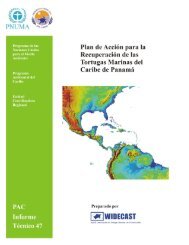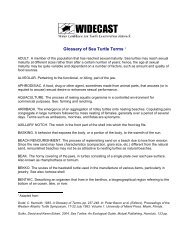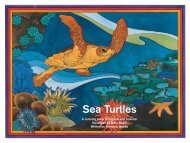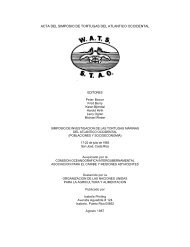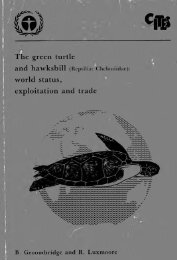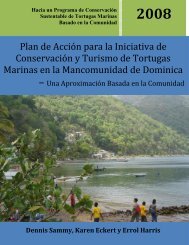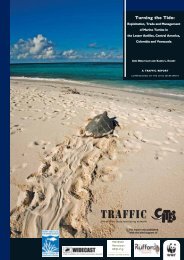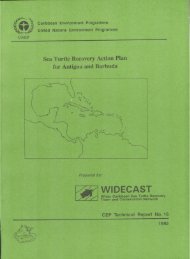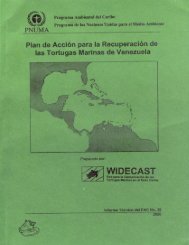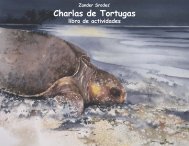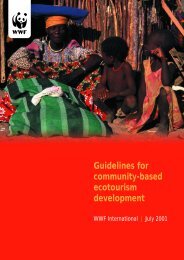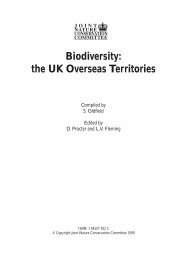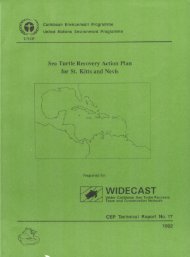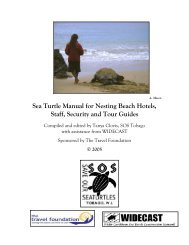(RoSTI) ANNUAL REPORT 2003 - WIDECAST
(RoSTI) ANNUAL REPORT 2003 - WIDECAST
(RoSTI) ANNUAL REPORT 2003 - WIDECAST
Create successful ePaper yourself
Turn your PDF publications into a flip-book with our unique Google optimized e-Paper software.
<strong>RoSTI</strong> Annual Report <strong>2003</strong><br />
Franklin, Byrne and Eckert (2004)<br />
In-water Research- A local Turtle Sighting and Reporting Network was established in <strong>2003</strong> in<br />
collaboration with Dive Dominica, where <strong>RoSTI</strong> Project Manager Rowan Byrne encountered sea turtles<br />
firsthand during dives nearly every weekend. Boat captains also report very frequent sightings.<br />
It is clear from observational and anecdotal information available from the <strong>2003</strong> research season that<br />
much could be learned from initiating a more formal investigation of sea turtle distribution, abundance<br />
and behaviour in offshore waters. With this in mind, <strong>RoSTI</strong> staff have on many occasions spoken with<br />
Chief Fisheries Officer Mr. Andrew Magloire and Marine Manager Mr. Arun Madsetti concerning more<br />
organized in-water surveys in 2004. <strong>RoSTI</strong> Project Managers have been asked to prepare Methods for<br />
such an initiative and submit the document to the CFO for consideration, and have been assured of the<br />
full support of the Fisheries office.<br />
Such research may at first remain focused in Rosalie Bay, where <strong>RoSTI</strong> staff have logged observations of<br />
juvenile Green turtles, for example, apparently foraging on rock algae at the river mouth. This is an<br />
excellent opportunity for in-water research on juveniles. Fishermen at Fond St. Jean have also reported<br />
an “abundance” of juvenile Green turtles in the South of the island, as well as Loggerheads. There are<br />
further possibilities near Calibishe, Soufriere, Portsmouth, Salisbury, and Cabrits Marine Park, Anse de<br />
Mai, Woodford Hill, Hamstead Beach, and the Calibishe and Atkinson beach area in Carib territory.<br />
These opportunities are not only very exciting avenues for research, but also represent an effective way to<br />
involve and work more closely with fishermen and fishing communities around the island, thus enhancing<br />
the mutual exchange of information and ideally garnering broader grassroots support for research,<br />
conservation and management activities with endangered sea turtles. There is a great potential for<br />
learning from fisher communities island-wide, as fishermen frequently catch turtles at sea (and during the<br />
hunting season, clean the turtle at sea). In one circumstance a fisherman in Point Michael reported to<br />
<strong>RoSTI</strong> staff that he had caught seven (7) turtles in his net in October <strong>2003</strong>; all were reportedly released<br />
unharmed.<br />
With all of this in mind, it is a recommendation that 2004 <strong>RoSTI</strong> staff design and prepare the<br />
methodology for in-water research at selected sites around the island (including Rosalie Bay). Such<br />
methodology should seek to incorporate livelihood generation activities, such as the opportunity offered<br />
by Mr. John Robins (Benjo’s Sea Moss) to involve fishers in the cultivation of seamoss for his food and<br />
beverages industry, based in Dominica. Mr. Robins is very supportive of research activity, and with the<br />
help of <strong>RoSTI</strong> staff he sees a chance for his project to become involved, as well, with local communities<br />
island-wide.<br />
It is noteworthy that <strong>WIDECAST</strong> will be designing in-water census programs to study foraging<br />
populations in selected Eastern Caribbean islands during 2004-2006 as a pilot project with UNEP<br />
funding. Participants will be trained in Barbados in partnership with the Barbados Sea Turtle Project, and<br />
also in Bermuda in partnership with the Bermuda Aquarium. It is a recommendation that Dominica be<br />
included in this pilot programme as soon as practicable.<br />
Habitat protection- Regulated multiple use areas, buffer zones, and various forms of habitat protection<br />
are among the tools that managers and concerned communities emphasise when seeking to safeguard and<br />
restore depleted natural resources. In the case of sea turtles, where poaching continues to pose a serious<br />
threat, it is a recommendation that a “Rosalie Bay Reserve” (RBR) be considered, perhaps under the<br />
authority of the Fisheries Act.<br />
34



